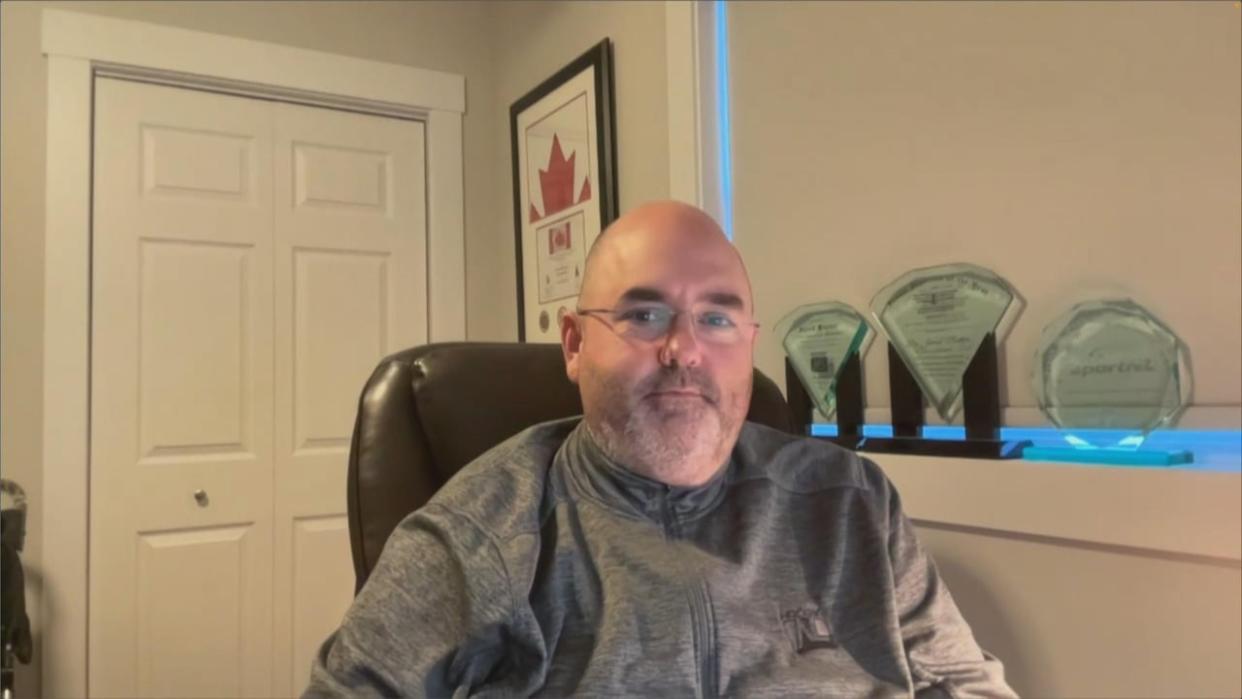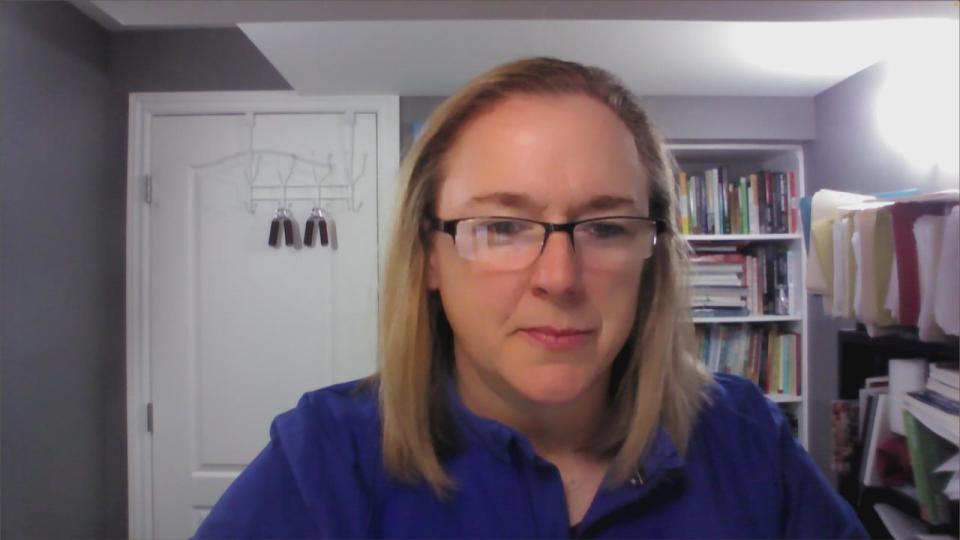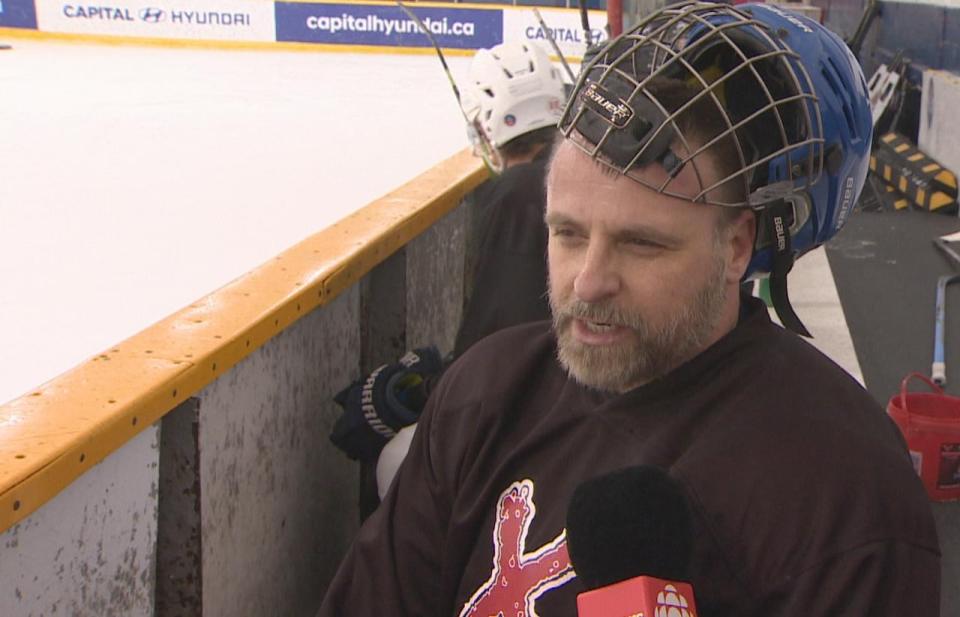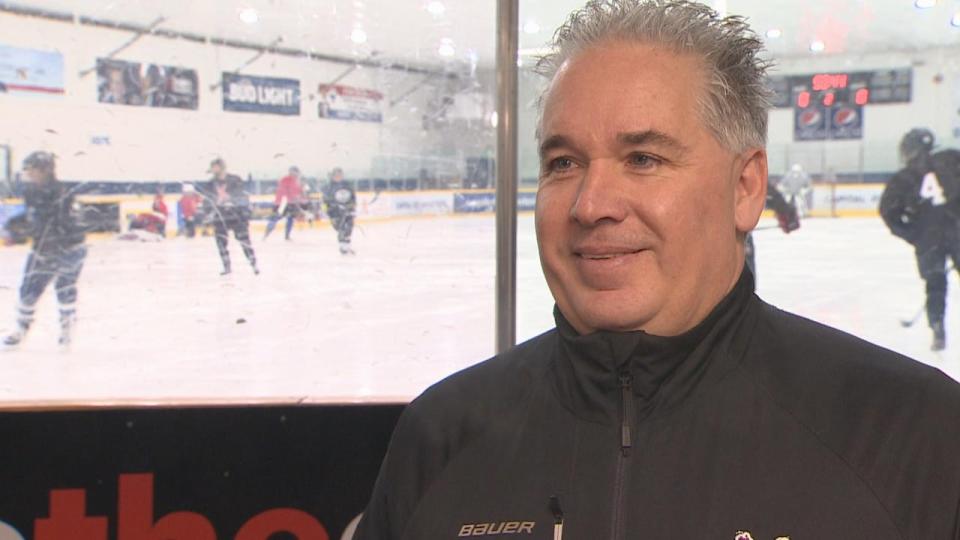Hockey N.L. president says increasing altercations behind decision to axe post-game handshake

- Oops!Something went wrong.Please try again later.
- Oops!Something went wrong.Please try again later.

Hockey N.L. president and chief medical officer Jared Butler hopes that by removing the post-game handshake and introducing a pre-game acknowledgment, they can reduce the number of incidences and maintain sportsmanship. (Zoom)
Hockey Newfoundland and Labrador president Jared Butler hopes that by eliminating the post-game handshake they can reduce what he sees as a trend in escalating incidents in minor hockey.
In late December, Hockey N.L. — the sport's amateur governing body in Newfoundland and Labrador — announced it was discontinuing the practice and instead, was introducing a pre-game acknowledgement.
Butler pointed to a Hockey Canada report that found N.L. had the second highest number of maltreatment and discrimination complaints, which he called "concerning" and in need of correction.
"Now one event is too many, one event is too much in the handshake lineup for us. But the pattern of events and the intensity of those events when they do happen, the gravity of them, the ages we're seeing them at, are concerning," Butler told CBC News on Tuesday.
He said they vary in intensity, "from full-on altercations to verbal altercations." There are incidents that start at the handshake and go off ice, with some spilling outside the arena.
Butler said the longstanding handshake isn't being removed, but just moved to the start of the game. He said it might reduce the risk of "inappropriate interaction" between players, "while still at the same time looking at health and safety for everybody involved in it. It's a tough, tough balance."
Moreover, Butler said dealing with the few "troublemakers" by giving suspensions hasn't curbed bad behaviour. He said the decision announced last month wasn't based on a single incident but a pattern over time.
Done in consultation
The pre-game acknowledgement is a trial and they will see if it makes a difference, said Butler. From there, they'll examine the outcome and whether to continue with it.
"But if we don't try anything, we're going to be doing the same thing over and over again and not shifting the underlying challenges that we're seeing in the game."
Butler said this was a decision reached after looking at other jurisdictions and other organizations who do pre-game acknowledgements.
The decision has gotten a lot of reaction, with even premier Andrew Furey weighing in, as well as making news across Canada and at the World Junior Hockey Championship in Sweden.
Butler is aware of the discussion the situation has brought on and said that it's had a big impact on the organization and its volunteers.
But Butler said it was not a decision they reached on "a whim" but was analyzed from multiple perspectives, "with an effort to try to do something different for health and safety reasons, while maintaining sportsmanship and reducing some of the challenges that we were seeing in that trend over time."
Sports psychiatrist weighs in
Dr. Carla Edwards, a sports psychiatrist in Waterdown, Ont., said she was shocked when she heard the news that Hockey N.L. was suspending the post-game handshake.
"In any any sports situation, there's an opportunity to lead by example and I think we need to do that the right way and I fear that by changing the game and by eliminating the post-game handshake, Hockey [N.L.] may be leading by example in the wrong way."

Dr. Carla Edwards, a sports psychiatrist, says there are other high-impact and intense sports that have players acknowledge each other after games. (Zoom)
She also takes issue with dismissing the post-game handshake because of a few players behaving badly.
"I think we have to look at what the problem is. You know, why is the behaviour happening and how can we change the behaviour, versus changing the culture of sport in itself, which actually has some bigger implications."
She also worries what other elements of the game could be done away with due to the poor actions of a few people. She said the game takes place under intense conditions that require players to contain themselves, like in the case when there's a late goal in a game or a disputed call.
"I think we need to really set boundaries and expectations and codes of conduct, and deal with those people appropriately, rather than changing the game itself."
While other jurisdictions have discontinued the post-game handshake, she said it isn't a major trend.
Players react
At Capital Hyundai Arena in St. John's, CBC News spoke with a number of players on the recent decision during a pickup game.
Gord Healey said he didn't agree with it. "I think it's sad actually," he said. "It's a bit of an oxymoron because the game has grown so much since I've been a young man. I'm 51 now. And it's all about ... greeting everybody. The friendships. Diversity. And uniting everyone together."

Gord Healey said hockey teaches players to leave their competition on the ice and the post-game handshake promotes sportsmanship. (Danny Arsenault/CBC)
Healey also pointed to basketball, football and soccer, where there are occasional incidents during the post-game lineup but he said all the players aren't punished based on the actions of a few.
Ed Oates, who has been involved in hockey for 40 years as a coach and player, said the post-game handshake is a sign of sportsmanship. During his time in the game, he said he hasn't seen many incidents during the handshake lineup, adding that he thinks it teaches both adults and kids that this is a game and when it's over, they shake hands and move on with their lives.
Steve Marshall said those at Hockey N.L. must have a reason behind the decision, but he's sad about it.
"It's a big part of the game. It's a game, you know? It's not a blood sport," said Marshall, who would like to see the decision reversed.
Defending Decision
Xtreme Hockey owner Andrew McKim is in agreement with Hockey N.L. and said people are overblowing the change.
He said there have been a lot of altercations at games and referees were having a difficult time handling it, and hopes the pre-game handshake will help reduce those altercations.
This also isn't a hockey-only issue, said McKim, pointing to an incident with Carl English, when N.L. Basketball suspended the former professional player for an altercation with a student who refused to shake hands after a game.

Andrew McKim, who played professional hockey and now owns Xtreme Hockey, said the post-game handshake has just been moved to the start of the game. (Danny Arsenault/CBC)
Still, McKim said Hockey N.L. should have explained the reasoning sooner.
"They should have come out and maybe told everybody how many incidents that have happened and how many suspensions have occurred. Instead of just coming out and saying we're going to change the handshake."
Butler said Hockey N.L. 's communication efforts need to be improved and that unrelated to this issue, they have been working with an individual to help on that front. It's set to be discussed at this month's board meeting.
Download our free CBC News app to sign up for push alerts for CBC Newfoundland and Labrador. Click here to visit our landing page.

